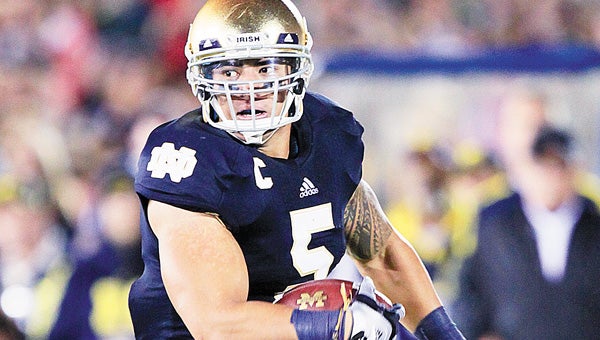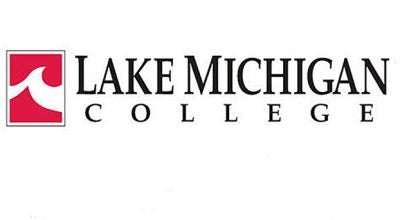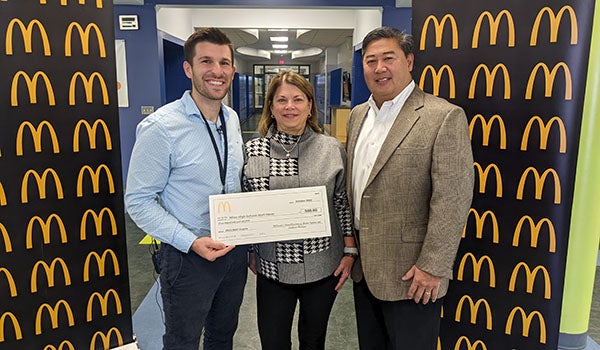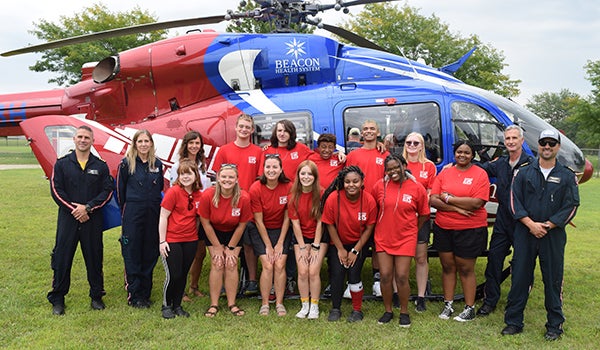Notre Dame a success on the field and in the classroom
Published 11:22 am Sunday, December 23, 2012

The Fighting Irish are ranked No. 1 in football and No. 1 in Graduation Success Rate. (Leader photo/file)
Notre Dame is accustomed to being first.
The Fighting Irish football team will enter January’s BCS National Championship Game ranked No. 1.
The team’s Graduation Success Rate for all its student-athletes is the best among the 120 largest Division I schools, making it the first team to garner the top spot in both of those all-important metrics.
And, not surprisingly, the school was the first to implement a comprehensive academic support system for student-athletes.
In 1964, the university created a program now known as Academic Services for Student-Athletes, which reports directly to the provost’s office instead of the athletic department. It was the first of its kind, and the results suggest it’s still among the best.
The key to that success, Notre Dame officials say, is the department operates with autonomy from athletic interests. Rather than competing with professors and department heads for student-athletes’ time and energy, they work in concert.
Coaches are hired knowing that, though they’ll be in regular contact with the Academic Services team, they’ll hold no sway over the academic decisions counselors make. This creates what several staffers call “healthy tension” between counselors and coaches who are simultaneously pushing for excellence in different arenas. That tension, though, has long led to triumph in the classroom. Since the Graduation Success Rate (GSR) was first reported in 2005, Notre Dame has ranked no lower than second among the largest Division I schools.
“The issue wasn’t whether we could restore football,” says Notre Dame athletic director Jack Swarbrick. “The issue was whether we could restore football and remain at the top academically. That was our challenge. That was the goal. There are few things that I’ve been associated with that I take greater pride in.”
Program started 48 years ago
That pride, and a program that has grown to eight staffers and more than 200 tutors, has humble, decades-old roots. Forty-eight years ago, former university president Theodore M. Hesburgh and executive vice president Edmund P. Joyce gave Mike DeCicco, then Notre Dame’s fencing coach and an engineering professor, an important assignment. They asked DeCicco to create a service that would ensure student-athletes had extra academic guidance as they navigated the increasingly complex life of a modern-day student-athlete.
DeCicco put calls in across the country in search of advice, only to find that no such program existed anywhere he looked. So he built one from scratch that pushed student-athletes in the classroom not to merely keep them eligible, but to better prepare them for life after they shed their jerseys for the final time.
“I must have made 100 calls, and within two weeks I realized there were hardly any schools that even bothered with it,” DeCicco said earlier this year in a story written by the Notre Dame athletic department. “One major school touched on it, but a coach was in charge — the ‘academic coach.’ It sounded like all he did was make sure the players were doing enough to stay eligible. Father Joyce made it clear that he wanted more than that. He was adamant that our athletes graduate and not just do enough to stay eligible. He said the degrees would measure the success of our athletic program.”
What DeCicco started five decades ago is now in the hands of Notre Dame alumnus Pat Holmes, who has been the program’s director since 2003. Today, Academic Services for Student Athletes is located in the bottom floor of the Coleman-Morse Center on Notre Dame’s quad, far from the school’s athletic department. The office space is routinely augmented with student-athletes dropping in to chat with a counselor, working in a large study room or taking advantage of a private tutoring session in one of the several glass-walled rooms that line the facility.
Holmes, who in addition to running the program works directly with men’s basketball and women’s tennis student-athletes, and his counselors don’t tutor students directly. Instead, they help them manage their schedules and their lives. If a student-athlete is struggling academically, the counselors seek to alter decision making and improve time management.
By BRIAN BURNSED
NCAA.org
(Editor’s note: First of a multiple part series)






